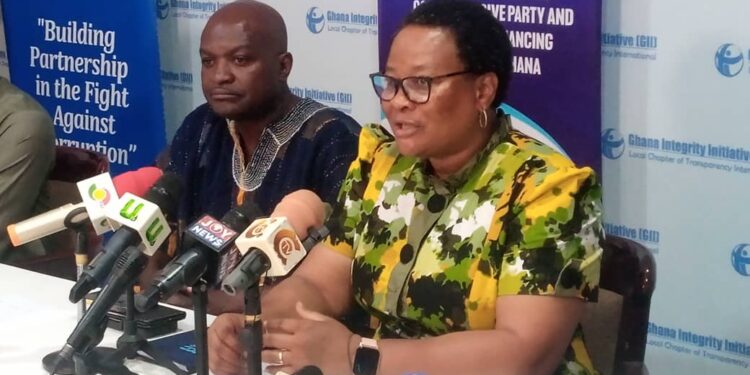CSOs Launch Project to Monitor Campaign Financing, Vote Buying and Abuse of State Resources Ahead of 2024 Elections
Executive Director of the Ghana Integrity Initiative (GII), Mary Addah, has sounded the alarm on the escalating monetization of Ghana’s electoral process, a trend she argues threatens the very fabric of the country’s democracy.
Speaking at the launch of a new Campaign Financing Project on Wednesday, September 11, 2024, aimed at monitoring political expenditures ahead of the 2024 general elections, Mrs Addah highlighted the mounting financial pressures that have come to dominate party politics in Ghana, particularly over the past three decades.
The new initiative – a collaboration between USAID, GII, Ghana Anti-Corruption Coalition (GACC), and Centre for Democratic Development Ghana (CDD-Ghana) – is designed to tackle several pressing issues, including vote buying, the abuse of state resources, and the financial inequities that disproportionately affect candidates from less affluent backgrounds.
According to Mrs Addah, the influence of money on elections is increasingly undermining public trust in democratic institutions and eroding the legitimacy of electoral outcomes.
“The excessive monetization of our elections has created barriers that alienate significant segments of the population (sic),” Mrs Addah stated, underscoring the challenges faced by women, youth, and vulnerable citizens who lack the financial means to compete effectively in the political arena.
She noted that, based on a recent assessment by CDD-Ghana and the Westminster Foundation, parliamentary candidates need to raise an average of GHS 389,803 (approximately $85,000) just to navigate the internal processes of their parties. For presidential candidates, the amount jumps to GHS 1 million.
The Executive Director for GII noted cautioned that as monetary demands increase, the political landscape becomes increasingly skewed in favour of affluent candidates, effectively sidelining many potential leaders who could contribute to the nation’s governance.
“This trend not only limits competition but also diminishes the quality of representation in our democratic processes (sic),” she added.
At the heart of the GII’s concerns are the significant gaps in Ghana’s campaign financing laws, which Mrs Addah described as outdated and inadequate for addressing the complexities of modern political funding.
Current regulations, as outlined in the 1992 Constitution and the Political Parties Act, fall short in several key areas, particularly in relation to public funding and the oversight of private donations.
“While our laws make provisions for public and private funding, they lack clarity on several crucial points, including who can legally donate and how these contributions should be disclosed,” she explained.
Furthermore, Mrs Addah criticized the lack of limits on individual donations, noting that this allows wealthy individuals and corporations to exert disproportionate influence over political campaigns.
The GII’s new project is poised to play a critical role in monitoring the upcoming elections. By focusing on over 100 constituencies, the initiative aims to capture instances of vote buying, the misuse of state resources, and violations of campaign finance laws.
This comprehensive monitoring effort is intended to enhance accountability and promote transparency in political financing, thereby restoring public confidence in the electoral system.
As Ghana approaches the 2024 elections, the stakes are high, and with political financing issues at the forefront of national discourse, there is a crucial reminder of the need for reform.
“We cannot allow the current state of affairs to continue unchecked. Our democracy depends on it,” she concluded, calling for collaborative efforts among civil society, political parties, and government institutions to address these pressing challenges.








